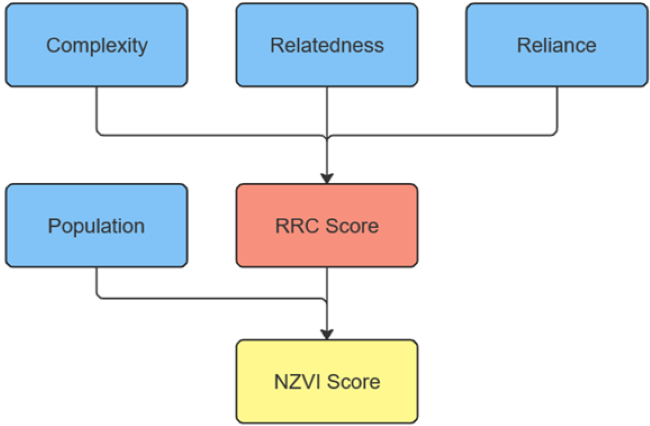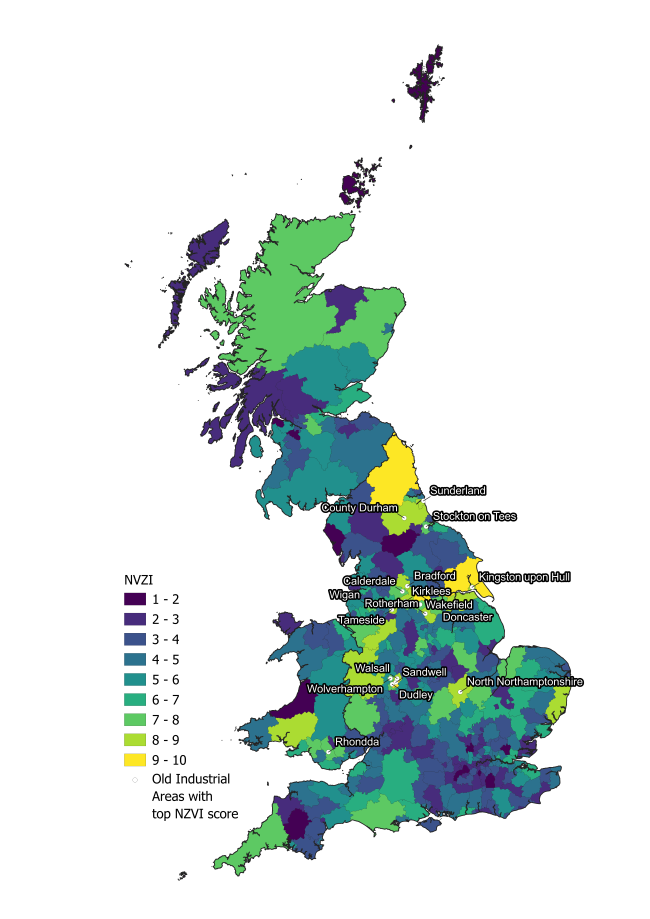A new net zero resilience index finds that jobs vulnerable to decarbonisation require a regional approach
Achieving net-zero requires extensive economic changes in the world of work for many. As some sectors will pivot to new activities to meet the demands of the net zero transition, new jobs will emerge. Others will decline entirely as sectors (such as offshore oil and gas) are phased-down.
About the research
An estimated 7% of the UK workforce will experience these changes (approximately 2.2 million people). For many, this will represent an economic shock which needs to be mitigated by proactive policy. This process is already active: evident in with concerns about job losses Grangemouth, Port Talbot, and Sunderland (to give a few examples).
Impacts will not be distributed evenly. Understanding the geography of economic vulnerability and resilience—where the winners and losers are likely to be—is essential to develop place-based policies to mitigate the unintended negative consequences of the UKs net zero transition.
We have developed a net-zero resilience index (NZRI) to reveal the people and places where these impacts might be clustered. This research plugs a gap in current understandings of this vulnerability by tracing and mapping which communities in the UK are both vulnerable to economic change.
Key findings
The Net Zero Resilience Index assesses risk across four factors: Complexity (employment diversity), Relatedness (industry co-location), Reliance (dependency on few industries, especially those at green restructuring risk), and Working Age Population. This determines not just vulnerability to an economic shock but also the resilience of the local economy: its ability to bounce back, pivot and provide new jobs for those affected. Each Local Authority District receives a 1–10 score, highlighting economic resilience and vulnerability to guide targeted support.
The NZRI highlights 32 Local Authorities that are more vulnerable to net zero as an economic shock and require additional policy support to ensure greater resilience.

Key themes
1. 17 of the 32 Local Authorities identified as least resilient are found in old industrial areas that declined post- industrialisation (see Map 2): highlighting the importance of previous economic shocks in determining future resilience.
2. 21 of the 32 Local Authorities identified are in existing Mayoral Combined Authorities and three are in Combined Authorities that will become active in 20245 (see Map 3). This overlaps with Local Authorities identified in recognised green industrial clusters (such as Humber, West Midlands, Merseyside, Tees Valley) that are welcoming increased green investment, through hydrogen or carbon capture, use, storage, and infrastructure. In addition, two Local Authorities identified are in Scotland (Aberdeenshire and Highland) and two in Wales (Rhondda Cynon Taff and Carmarthenshire).
3. However, several outliers necessitate new approaches. Local Authorities identified that are not in clusters or in devolved authorities are often coastal or rural areas reliant upon insecure or low-pay work. Examples include Rhondda Cynon Taff (a prevalence of health and social care work) and Shropshire (agriculture). Whilst these jobs may not be directly impacted by net zero, they signal an important vulnerability to economic shock requiring further investigation.

Policy implications
Net zero and climate action are important and necessary policy goals. Those devising decarbonisation policies must remain aware of the unintended consequences of this transition. A net zero transition should not worsen regional economic inequalities. Vulnerability to net zero highlights economic conditions (often an enduring legacy of previous economic shocks) that must be addressed in future policy:
- Future Net Zero policy must support communities in old industrial towns: Due to a lack of resilience to bounce-back to any job loss caused by net zero. A route to mitigate this is through proactive targeted investment to build new industries and workplaces in these communities.
- Devolution provides a key route to support communities: Devolved authorities hold key powers to support workers experiencing job loss, including adult skills budgets. Recent ‘trailblazer’ deals with the Greater Manchester Combined Authority and West Midlands Combined Authority included some devolution of net zero policies. The development of new Local Growth Plans (present in Labour’s 2024 manifesto) and devolved approaches to net zero will support resilience-building in communities at-risk.
- More attention must be paid to communities beyond existing industrial clusters: Further research is required to understand resilience in Local Authorities in coastal and rural areas, which are currently limited by reliance on sectors of precarious work such as agriculture (rural) and tourism and services (coastal communities).
Further information
This work has been funded by the Bristol Poverty Institute via its 2024 Seedcorn Fund, as well as ESRC Impact Acceleration funding (2024). It is accompanied by an interactive web-map, found here.
Authors
Tom Cantellow is a researcher at the University of Bristol. His work uses spatial quantitative methods to study a range of political and economic phenomena, such as elections, local economies, inequality, values, and political violence.
Dr Ed Atkins is a Senior Lecturer in Human Geography at the University of Bristol. His work focuses on energy transitions and socio-economic justice.
Professor Sean Fox is Professor of Geography and Global Development at the University of Bristol, focusing on the causes and consequences of global urbanization, the political economy of urban governance, and sustainable city futures.
Dr Caitlin Robinson is a Senior Research Fellow and Proleptic Lecturer in the School of Geographical Sciences at the University of Bristol. Caitlin’s research investigates the causes and consequences of different types of spatial inequality, with a particular interest in energy poverty and energy justice.
